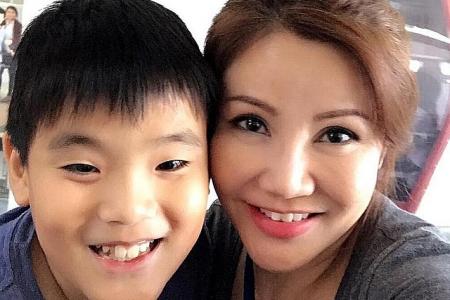MOE to make mental and cyber wellness a priority in schools
New curriculum will help students learn to better support each other emotionally and socially: Indranee
She lost her 11-year-old son Evan when he jumped to his death in 2017 after struggling with depression.
Ms Doreen Kho, a 46-year-old housewife, yesterday said Evan had written an essay about depression in school and mentioned jumping off a building.
The school informed her of the essay but no further support was offered, she added.
On how things might have turned out differently, Ms Kho told The New Paper: "I was desperately looking for help. If only there had been some kind of support or if the school had reached out with more help."
The Ministry of Education (MOE) yesterday announced a slew of new initiatives to bring mental health support and education into schools by making it a part of the curriculum.
Second Minister for Education Indranee Rajah said during the debate on MOE's budget allocation that the Character and Citizenship Education (CCE) curriculum in secondary schools will be revised to include mental health education, among other things.
She said the new curriculum will help students understand common mental health issues and the symptoms, know when and how to seek help for themselves and others, and develop empathy and care towards persons with mental health issues.
The polytechnics and Institute of Technical Education have also worked with the Health Promotion Board to develop mental health resources for their students, she added.
Additionally, by 2022, all schools will establish a peer support structure and culture.
Students will actively learn how they can better support each other emotionally and socially, promote mental well-being and cyber wellness, and advocate for a more supportive environment while still having teachers and counsellors they can escalate the issues to.
Ms Indranee said: "Even so, there will be a small number of students who struggle with mental health issues.
"For these students, additional support by professionals is needed."
As it is crucial to identify these students to support them, teachers are trained to pick up signs of distress, reach out to those facing difficulties and refer them to a counsellor if necessary, she said.
Samaritans of Singapore (SOS) chief executive Gasper Tan stressed the importance of programmes to build resilience.
He told TNP the SOS suicide hotline received 11 calls from children aged five to nine and 1,533 calls from those aged 10 to 19 during fiscal year 2018-19.
"The issues expressed and raised by younger clients reflected their low sense of self-worth," Mr Tan said.
"Students often look to self-harm behaviours as a form of coping with their negative emotions."
He said teachers and peers are an important first line of defence and having resources to help students and teachers understand mental health and suicide helps the community be proactive rather than react to a mental health crisis when it occurs.
Ms Kho said that while the MOE's initiatives are a good start and send out a positive signal that mental health is important, a stronger focus on ensuring that children are able to get professional help is crucial.
She said that close communication between the school, home and student is necessary to ensure the programmes are effective.
YEARLY CHECK
Ms Kho suggested schools implement a yearly mental health check, similar to dental check-ups, to properly diagnose and help students who may have hidden struggles.
She added that while teachers will need proper training in mental health care, they might still not be qualified to offer professional support.
Apart from mental health support, the CCE curriculum will focus more comprehensively on cyber wellness, moral and current affairs components.
Other initiatives announced yesterday include the roll-out of a national digital literacy programme where all secondary school students will have their own personal learning device, such as an iPad, by 2028.
Education Minister Ong Ye Kung said all students will get an Edusave top-up of $200 to support the purchase, and those from lower-income households will get further subsidies.
Schools will revise their syllabus to include more computational skills and material on artificial intelligence and emerging technological advances.
There will also be more Asean-focused content in secondary schools and junior colleges over the next three years.
More schools will offer conversational Chinese and Malay, and introduce a new 10-hour lesson package to prepare students for Asean trips, starting with Thailand and Vietnam.
There will also be measures to provide support for disadvantaged students, with several adjustments to be made to MOE's Uplift (Uplifting Pupils in Life and Inspiring Families Taskforce) programme.
The Financial Assistance Scheme will be enhanced, with students under the programme receiving higher subsidies for transport and meals.
MOE will also do more to support students with special educational needs (SEN), including giving access to teachers in mainstream schools to bite-size online learning modules to better equip them to teach SEN students.
The SEN fund for poly and ITE students with physical or sensory impairments will be extended to those with learning and behavioural difficulties such as dyslexia and autism.
MOE will also be enhancing training and development programmes for teachers to ensure they are equipped to meet the changing needs of students.
Get The New Paper on your phone with the free TNP app. Download from the Apple App Store or Google Play Store now



